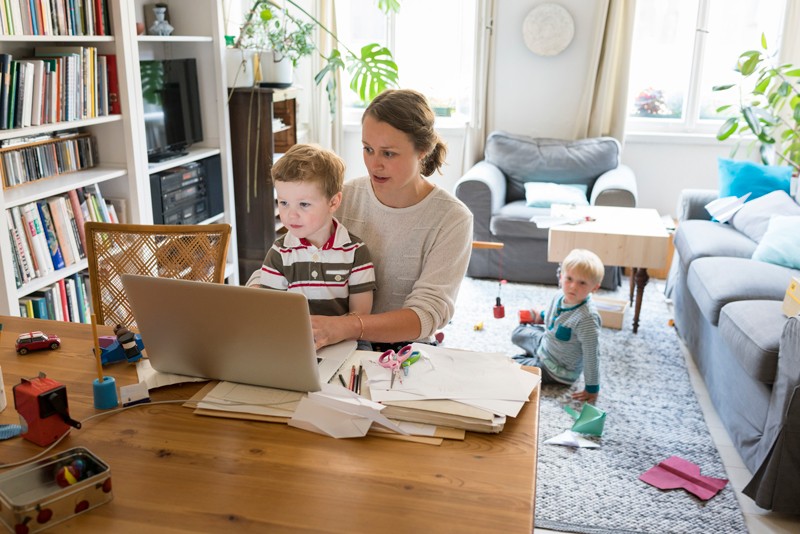The flood of e-mails started on Sunday 15 March. All schools in Switzerland were closed because of the pandemic, and teachers were sending instructions about what they would ask me to teach their eight- and nine-year-old sons in the coming weeks. The next set of e-mails provided a list of homework assignments, which were to be printed, taught, corrected, scanned, and returned to teachers by the end of the week. That same evening, I received WhatsApp notifications about four new parent-teacher groups.
At the same time, my university, the Swiss Federal Institute of Technology (EPFL) in Lausanne, was closed to everyone except essential staff, so I would have to work from home. Suddenly, I had become a full-time mother, teacher and research scientist. My husband, who also looks after children under normal circumstances, is part of a team managing a hospital, and is therefore unable to work from home.
The thrill of working remotely started from Monday morning itself. I made a plan for the day and printed out teaching and homework assignments for the kids, and we even agreed on a reward system for good conduct. Our workstations were arranged side by side so that I could keep an eye on my kids and help them if they had any difficulties. It was 9 in the morning, the weather was fine and I was still confident that I would be in control of the day. After all, planning is one of my strengths.
I had my first lab meeting at 10 am on the videoconferencing app Zoom. For the sake of peace, I asked the children to go outside to play, hoping there would be no disaster. By 10.30 am, the meeting was going well: the online connection was fluid, my colleagues were taking an active part and the discussion was going well.
But suddenly I heard my youngest boy screaming. I muted the microphone and went outside, only to find him falling off his bike with glasses broken. At that precise moment, I realized that the days and weeks ahead would be more complicated than expected.
From then on, I tried to keep my work day going, but was constantly interrupted to prepare meals, to resolve conflicts, to help with homework, and to respond.
By the end of the day, I was exhausted, even though I hadn’t left my house, and I hadn’t taken a moment for myself. I found myself walking 30-minute pilots—one of a handful of resolutions I wanted to keep during this period—off my schedule.
On Tuesday morning, I realized I was lagging behind in my work, and my stress and anxiety levels went up a notch. I contacted my lab leader, Hilal LaShuel, to reorganize my priorities and bring them into line with my new routine. We had made a detailed plan of how the team should work and collaborate remotely, but I failed to realize at what level of disruption I would face.
He reassured me and reminded me that the main message of our research continuity plan was to prioritize families and their well-being. I felt reassured for a moment, but then the reality of life in the world struck me again.
On Wednesday, notifications from WhatsApp groups — from the lab, to my kids’ teachers, parents — and Slack work groups, e-mails, and Zoom meetings became frequent. My children repeated the interruptions of the previous day. For the first time in my life, I felt that I was lagging behind the rest of the team.
At this stage, three days into the lockdown, my guilt about not doing enough for my job or my kids was at its peak. Above all, scientists around the world began publishing articles and infographics on Twitter and elsewhere to explain the positive effects of remote working and confinement on their creativity. My social-media timeline was filled with success stories as I faced another day of faltering productivity and guilt.
And here I am broken. I shared my concerns and feelings with my boss. His response was straightforward: Let me take the time needed to bounce back by reflecting on my experience and sharing it with our scientific community.
So, I started talking to coworkers, friends, and family members. I quickly realized that most of the parents working from home were facing the same situation and difficulties that I was facing. Nice to know that I wasn’t alone. We’ve increasingly created parent support groups – which means more WhatsApp notifications, but that’s okay. It helps us to ease our difficulties, to laugh at the daily bizarre situations caused by the work of meeting children, and most importantly, to support and encourage each other.
I have yet to find all the solutions to the difficult equation of balancing family and professional life. But I am working on it. After all, I’m a researcher: it’s my job to find solutions. In the meantime, it’s nice to know that I’m not alone.
